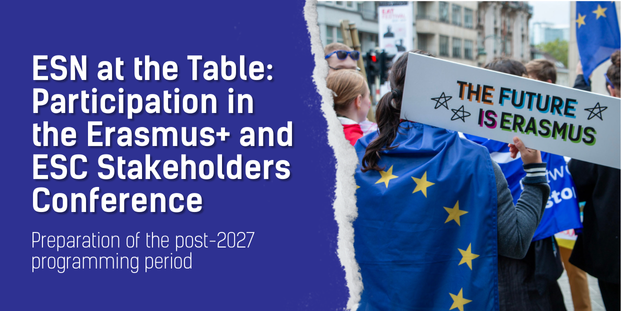
On the 18th of February 2025, the Erasmus Student Network actively participated in the Stakeholders' conference on the preparation of the Erasmus+ and European Solidarity Corps post-2027 programming period in Brussels, Belgium.
As part of the first phase of co-creation of the post-2027 programming period of the Erasmus+ and European Solidarity Corps programmes, DG-EAC organised this conference and invited a broad representation of stakeholders involved in the current programmes, such as the Erasmus Student Network.
The conference opened with remarks from Pia Ahrenkilde Hansen, Director-General for Education, Youth, Sport and Culture, followed by an insightful speech by Executive Vice-President Roxana Mînzatu, highlighting the role of social rights, skills development, and preparedness for future challenges. Commissioner Glenn Micallef further engaged participants in a dialogue on the significance of intergenerational fairness and youth participation in shaping European policies.
Throughout the day, ESN actively contributed to discussions on key themes, bringing forward perspectives on enhancing mobility opportunities, fostering inclusion, and ensuring the long-term impact of international experiences. During the panel discussion on the future of the programme, ESN reinforced the need for greater accessibility and financial support for students and young people from diverse backgrounds, as well as the importance of long-term collaboration with local and national stakeholders.
Several members of ESN present engaged in several thematic workshops, providing input on:
- Citizenship and European Values: Highlighting the need for democratic participation and civic engagement beyond mobility.
- Inclusion and Outreach: Advocating for better support mechanisms for students with fewer opportunities, including addressing financial barriers and ensuring a truly inclusive experience.
- Green and Digital Transition: Addressing the behavioural gap in sustainable practices within mobility programmes and advocating for digitalisation strategies that enhance accessibility and efficiency in programme administration.
During the plenary feedback session, ESN reiterated its commitment to shaping the future of Erasmus+ and the European Solidarity Corps by ensuring that the voices of international students and young volunteers are heard. The discussions underscored the need for a balanced approach that aligns with EU priorities while maintaining the grassroots essence of youth engagement.
As the post-2027 programming period takes shape, ESN will continue advocating for improvements in the areas of inclusion, mobility, volunteering, and policy support, ensuring that Erasmus+ remains a transformative experience for all participants.
If you would like to have a seat at the table, fill out the European Commission’s online consultation for the next Multiannual Financial Framework on cross-border education, training and solidarity, young people, media, culture, and creative sectors, values, and civil society until the 6th of May 2025.
Stay tuned for further updates on ESN’s policy and advocacy work!

Follow ESN